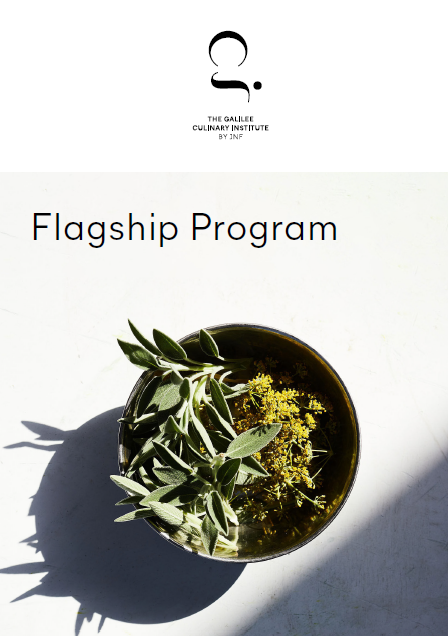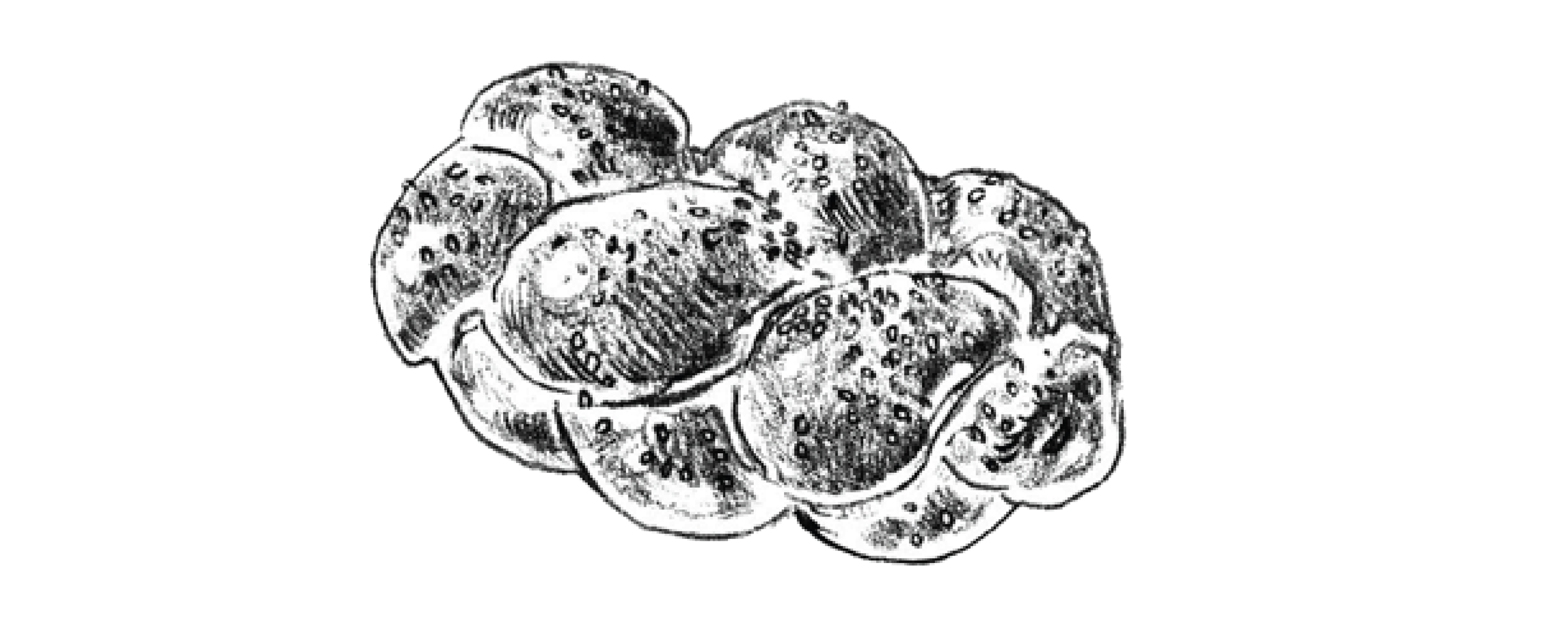
Yalla is an Arabic word that means “let’s go.” It’s used frequently in Hebrew and Arabic and can also be used to say “Let’s do it.”
Flagship Immersion Program
Galilee Culinary Institute by JNF, Rosenfield School of Culinary Arts is a revolutionary approach to culinary arts. This program is a 12-month, community immersion and intensive culinary arts program designed specifically for students to acquire a combination of practical culinary skills – and a broad application of the major themes moving the food world today.
GCI’s new approach to culinary education is based on a Discover, Engage, Create philosophy that is about helping students deeply understand subject matter. Learners will have ample opportunities for directed and independent work and research on food topics through lenses that match the four culinary personae—Storyteller, Activist, Entrepreneur, and Specialist.
The program is 12-months, but packs more than two years of education into the program. How? Through a total immersion approach with experiences inside and outside of the classroom. Expect to leave the Galilee Culinary Institute with a fully developed and vetted culinary concept on which to launch your culinary career.
Culinary Explorations
CULINARY LENSES
In advance of a student’s travels to Israel to attend the GCI, this online introductory course will serve as a program orientation, opportunity to meet faculty, staff and classmates and provides an overview of the framework students will use throughout their time at GCI.GCI’s Discover, Engage, Create philosophy is an approach to deeply understanding subject matter.GCI provides ample opportunities for directed and independent work and research on food topics through lenses that match the four culinary personae—Storyteller, Activist, Entrepreneur, and Specialist
DIVE RIGHT IN
This introductory kitchen course focuses on making students fluid and fluent in an operational kitchen environment. Built on the day-in-the-life experience and philosophy of GCI founding Chef Lior Lev Sercarz for culinary success, new students establish kitchen order with daily station set-up, facility organization, and habits of mind. Throughout the instruction, students explore the larger food cycle and system, visit farms, and support regenerative and sustainable agriculture, and waste management to include recycling and composting.
FOOD ACTIVE
To be truly effective in community food activism, professionals need a thorough grounding in food culture. The term food culture examines ethnicity and cultural heritage within families and communities. Students explore why people and groups make certain food choices through impactful, collaborative, and creative engagement with area businesses, non-profits, and individuals on issues that matter, collectively solving local and global problems. Using case studies in wheat, olives, and wine (WOW), students explore how food culture defines a society by creating connections among beliefs, ethnicity, identity and cultural heritage.
CREATIVE TECHNIQUES
While the GCI teaches global techniques and food preparation, students also practice managing a facility with separate meat and dairy kitchens according to the specific application of the principles of kashrut (the laws of kosher) and halal (permissible under Islamic dietary laws) cooking. The course introduces basic cooking methods and production, sauces and dressings, grains and legumes, and entry-level baking skills. Students who do not follow dietary laws can also benefit by approaching the process as a disciplined system of thought that can be applied to any kitchen.
EDIBLE STORIES
Storytelling is a powerful tool for connecting deeply with others and countering current damaging narratives in contemporary culture. Great storytellers need to intimately understand both their subject matter and their audience to convey messages for brand narrative, growing a business, and developing content marketing strategy. Students learn the power of this tool through detailed case studies which they will then apply to their projects throughout the program. Finally, aesthetics and design principles are applied to aspects of visual media, food styling, and messaging.
PERFECTING SPICE
The goal of this course is to transform the use of spice from a final act in the cooking process to one that defines a dish, a restaurant and a chef. Designed by Lior Lev Sercarz, GCI Chief Culinary Officer and Co-founder, this course distills three decades of his experience and expertise in spices. Based on Chef Lior’s knowledge, students learn about spice selection, blends, handling, storage, and culinary uses. Through the program, students visit local growers, markets, and spice traders to examine sourcing and distribution.
REDEFINING MEAT
Students practice multiple preparations of beef, lamb, chicken, fish and plant-based dishes. Learners appraise cuts of meat and fowl and demonstrate proper ways of sourcing, storing, and cooking of animal proteins. Students augment these cooking techniques with plant-based proteins. The tech ecosystem of Israel includes plant-based proteins and cultivated meat and is one of the country’s fastest growing sectors. In this course, students explore plate design to artfully arrange, sauce and garnish serving dishes.
CULINARY FINANCE
This course lays the foundation for sound financial practices and decision-making in food-related operations by controlling costs. Using financial reports and data from GCI’s restaurant, Cafe, and brewery, students analyze real-world campus operations as living case studies. Students evaluate food, beverage, and labor costs, practice budgeting, forecasting, financial analysis, as well as hands-on purchasing and receiving in the storeroom. The course presents flow-thru in a foodservice operation, reviews fixed, variable, and mixed expenses, and evaluates point of sales systems to include contactless payment methods in emerging technologies.
FOOD ROOTS
This course introduces students to farm operations with hands-on activities in our kibbutz and campus garden. Students learn basic principles of a regional food system, farm maintenance, and raising crops and animals. Students apply regenerative farming practices, assist with seasonal farm chores, and harvest produce for GCI activities. Students also benefit from experiences and projects with Israel’s leading Agri-Tech industries and food-technological innovations around how food is grown, packaged, distributed, and stored for efficiency, sustainability, and safety.
BUSINESS OF FOOD
This course introduces higher-level operational and financial concepts to culinary professionals. Cooks and chefs perfect their cooking craft early in their careers, but real operational success goes far beyond cost control and inventory. Revenue management is an operator’s most crucial skill. Starting with basic accounting principles, students examine financial planning and budgeting, facilities, capital purchases, and financial analysis of the operation through the use of profit and loss statements and other financial reports.
CAKE & BAKE
Chefs in any capacity need to possess knowledge and skills for baked goods, pastries, and basic chocolate work. This course introduces students to techniques and preparations of the bakeshop to include setup, workflow, and operations. Students employ ingredients, formulas, and dessert presentation required for an entry-level baker. Basic techniques for quick bread, yeast bread, artisan bread and sourdough bread are practiced. Students explore cake production and decorating as well as develop rudimentary skills to work with chocolates.
ENTREPRENEURIAL EXPLORATION
This course provides the food entrepreneur with skills and knowledge necessary to bring a food idea or product to market. From sample surveys about the business idea, to product differentiators, to the target market, students test their concepts in the local and international markets with the guidance from the GCI and local practitioners. Students establish business goals, pricing of their services or product, forecast profit margins and design modes of selling and distribution. Labor, capital resources, business strategy, branding, product positioning, and supply chain management are but the tip of the proverbial iceberg in a product launch.
EVENTS & CATERING
This course offers an advanced introduction to events planning and execution using catering and buffet skills in an operational setting. Students implement strategies and techniques professionals use to plan meetings, conventions, weddings, and other events. Students define the entire scope of a culinary event, including preparation and sourcing, menu design, staffing, presentation, and budgeting. Students participate in the planning and management of an actual event and conduct a post-event analysis.
ART OF THE MENU
Food operations rely on a menu for both reputation and profit. This course applies menu planning based on research, surveys, and sales analysis. Students practice yield test and standardized recipes, recipe costing, and menu marketing and merchandising. Starting with concept development and design mechanics, students examine menu pricing and marketing issues. Menus from various types of restaurants and food operations are reviewed to reflect industry trends.
POINT OF DEPARTURE
This course traces global ingredients and techniques, combining food production with a thoughtful exploration of culinary cultures. Students practice cooking with global sauces and techniques. They interpret flavor profiles from regional cuisines in Asia, the Mediterranean, Europe, and the Americas. Students assess the differences among domestic cookery, restaurant cuisine, and street foods and reconsider dated notions of rustic, contemporary, and haute cuisines.
SAFE FOOD
This course provides students with advanced knowledge of safety and sanitation practices in the food industry. Students focus on developing a preventative approach for controlling potential hazards and maintaining compliance with worldwide industry requirements. In addition, students will receive training in accordance with the US Food Safety Modernization Act (FSMA) to receive the designation of a Preventive Controls Qualified Individual (PCQI). This includes training in crucial areas such as food allergens, record-keeping procedures and supply-chain preventive controls.
FILL UP MY CUP
Creating captivating drinks with or without alcohol are a prime driver of profitable food operations. With local wineries, an on-campus brewery, bar, and coffee shop, GCI provides the ideal living laboratory for working with beverages in an operational setting. The Galilee affords students the opportunity to taste and analyze local wine, including relevant oenological topics such as terroir, viticulture and winemaking. Students gain practical knowledge with food and wine pairing, menu considerations, and bar service.
EAT & BE
This course outlines some of the basic principles of nutrition, including food preparation, menu planning and lifestyle. Students plan and create menus using leading nutritional guidelines. Particular emphasis is placed on food allergies, intolerances, preferences and restrictions to include kosher and halal, plant-based, low glycemic, macrobiotic, Ayurveda and paleo diets. Students also appraise the scientific, historical and cultural basis for a variety of diets as well as research or deliver community health-related engagement projects.
FOOD FOCUS
After the first six months of intensive hands-on training and applied culinary theory courses, students move to this guided study period and choose 2-3 projects, ideally using at least two theoretical lenses. Some examples might be creating a social media presence for local food activists (storytelling), examining flavor profiles and spice preferences based on imperial cultural influences (activism), or conducting market research for a local pomegranate grower (entrepreneurship). This immersive, authentic, food-systems approach provides the knowledge and skills for high-level work in the culinary industry and related fields.
EAT. ATE. CREATE.
After nine months of training, application, and trial and error, the student has refined their areas of interest and ability. The final product of the capstone course could be a traditional research paper, but more likely it will be more targeted and relevant to the student and GCI—a multimedia presentation, a new food product, an investor pitch, a marketing campaign, a major food event, or an analysis of food distribution during disaster response. Almost any combination of a lens, subject and output is possible. Few times in your life will you have the environment to fully immerse yourself into food projects of such range and impact and leave the institute with a fully vetted idea on the kind of chef you want to be and the career you are ready to pursue.





